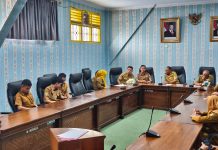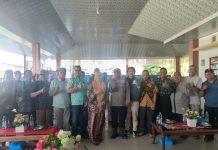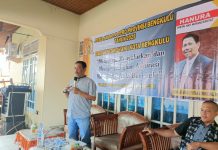Victor Kovalenko is going to be the star of a movie. A biopic based on the life of Australia’s most celebrated sailing coach has been in filming for months. Well, it was, until the Ukrainian actor playing him went to war with Russia.
“He is now on the frontline as a volunteer,” Kovalenko says. “He was in the war before, like in 2014, 2015 and 2016, also as a volunteer. Now he’s [an] officer and he has a lot of experience. They’ve done part of the film in Ukraine. They were supposed to do a little bit more, but now it’s war.”
Vladimir Putin “will not stop”, he says. “He has no brakes, only accelerator.”
Kovalenko is ensconced in the incomparable setting of Sydney’s Middle Harbour Yacht Club, where the water catches the sun and not a gunshot can be heard. But, like many others, the 72-year-old holds tight his ties to his homeland, and the people in it.
“I have my sister, my nephews,” he says, “and the sister of my wife, relatives, a lot of my friends and a lot of my athletes. My family is fine. Others, they are fighting. One of my athletes recently was injured – he lost one leg.”
Kovalenko, aged 27, on a 470 in Crimea preparing for the European championships. Photograph: Supplied
The film, titled Storm School, also retraces the careers of two-time Olympic gold medallist Mat Belcher and Chinese racer Xu Lijia. Kovalenko’s story is one of almost two separate lives. The first in Soviet-era Ukraine, where he was a multiple sailing champion and then a medal-winning Olympic coach. The other in Australia, where he has lived for 25 years and steered his adopted nation to unprecedented Olympic prosperity.
In the six Games since and including Sydney 2000, Kovalenko the coach has won six gold medals. That haul ranks him third in the world over that period, behind Great Britain (15) and Australia (10). He is a country inside one man. They call him The Medal Maker.
Kovalenko loves photos just about as much as he loves boats, so having his picture taken near some boats is about as good as it gets. He sits on the edge of the dock, feet swinging over the edge. Then, as directed, hops up and leans against a piling. Casual but also expertly pensive. He knows where the light is best and enquires about the model of camera. He has done this before.
The photography pastime extends to his smartphone, on which he has a sizeable collection ready for viewing. Of himself with Belcher and Malcolm Page, his London 2012 champion men’s 470 team. With his Sydney 2000 gold medallists. A close-up he took himself of Will Ryan’s taped-up fingers bearing his Tokyo 2020 gold medal – a final 470 triumph alongside Belcher (the separate men’s and women’s classes have been dropped from the Paris 2024 program).
Then comes the celebrity set. Victor with Julia Gillard. Victor with John Howard. Victor with Tony Blair. With Princess Mary and Prince Frederik (“I was coaching him”), Princess Anne (“I met her six times and we had a dinner at her castle in Edinburgh”) and Prince Charles (“I met him only twice”). Up next pop Felipe VI and his wife Letizia – the King of Spain was a sailor at the 1992 Olympics, and Kovalenko has coached his sister.
Kovalenko with his triumphant men’s and women’s 470 teams of Jenny Armstrong, Mark Turnbull, Belinda Stowell and Tom King. Photograph: Supplied
There are plenty of Victor and his wife Tatiana, and their son and granddaughter. But it’s the black-and-white shots which grab the eye. Of a 22-year-old Victor in his Soviet navy uniform, at a parade covered in medals, as a young child on a set of old-fashioned skis.
Kovalenko was born in 1950 in Dnipro, some 400km southeast of Kyiv. Back then the city was well on its way to becoming one of the USSR’s mightiest engineering hubs in the Cold War arms race, its Yuzhmash factory a world leader in the military and space industries. Now it is the subject of several missile attacks from the Russian armed forces.
A young Kovalenko in Dnipro. Photograph: Supplied
His upbringing is self-described as “very difficult”. The son of a nurse and a second world war tank driver spent his early years living in a single bedroom with his entire family. They shared a small three-bedroom apartment in a big building with two other families. In all there were 12 people living there.
“We had a toilet, a kitchen … no shower,” he says. “You can get shower once a week on the ground floor. Thursday was for men and Friday was for women.”
Kovalenko has plenty of similar stories. Rolls them off the tongue as if they happened yesterday, always particular with the details. He is big on details. Maybe that’s why he wins so much.
“Even now, for example, in Russia 28 million people have no toilet in their house and 36 million people have no hot water in their house. At that time it was even worse. People were living like slaves. And if you come, for example, to Germany or to France to see how they’re living …”
The thing about seeing how others were living was that it was fiendishly difficult to travel abroad. The Iron Curtain was impregnable, and citizens rarely caught a glimpse of capitalist society. As a strapping athlete with a positive image to sell the world, Kovalenko was one of the privileged few. He had already served in the army – he excelled especially at Morse code – before his sailing skills earned him an invite to the navy in Moscow. Now he was competing for the national team.
Walking under the weight of medals at a parade in Dnipro in 1979. Photograph: Supplied
“The first time I went overseas, I had to prepare a lot of documents to confirm how loyal I am to the system,” he says. “A KGB agent came to my neighbours and my friends to talk about me. I had to do an exam with questions, for example: ‘who is the chairman of communist party of Chile?’ When you pass all this they give you access to socialist countries like Bulgaria or Czechoslovakia.”
Kovalenko got his first taste of life outside in Bulgaria, where he could not quite believe salami was available to buy at the shops. “Like, wow,” he lifts his hands in reverence, “salami in the shop. In Russia you can buy sausages and cheese in the shop, but it was only one cheese, and sausages were just a mix of meat with paper.”
In 1985, during a flight connection in Ireland en route to a competition in Cuba, he saw his very first can of Coca-Cola – the ultimate symbol of capitalism. He purchased one and smuggled it back to Ukraine to show his family and friends.
After a few successful trips of this nature he was permitted to visit “real countries”, but always with a KGB chaperone in tow. Kovalenko swipes around to find a photo of his sailing team in Paris, posing cheerfully in front of the Eiffel Tower. Then he points to one of the men – the accompanying agent.
Salt is in Kovalenko’s blood but not his demeanour. He is warm and softly spoken, with a hint of playful humour suggesting mischief-making in his younger years. All morning he has had his eyes on a moored inflatable dinghy practically waiting for a spin around the harbour. We oblige, swooping in and out of several coves.
Kovalenko, fourth from right, with the Soviet sailing team during a trip to compete in Paris. Photograph: Supplied
Tucked away in one floats a derelict house boat, its occupancy status unclear. Kovalenko steers closer. “Helloooooo,” he calls. “Is somebody there?” Pause. “Delivery!” No answer.
“Want to drive?” He hands over the wheel, then takes it back when a Marine Area Command boat comes into view. “Now we have to slow down because police are here,” he says, giving the officers a wave.
It has been almost 50 years since Kovalenko won his first national championship in 1973, as a member of the USSR team. The Flying Dutchman was his class of choice, before he started in the 470 and became national champion in that too.
But his Olympic aspirations as an athlete ended after the Soviet boycott of the 1984 Los Angeles Games. He turned to coaching, taking charge of an unheralded women’s 470 team, which would contest the first exclusive women’s Olympics sailing event at Seoul 1988. Not much was expected of Larisa Moskalenko and Iryna Chunykhovska; they took home bronze.
After the fall of the USSR, Kovalenko began coaching the men’s and women’s team for Ukraine. At the 1992 Olympics in Barcelona, the newly independent state sailed as part of the joint Unified Team team alongside Russia.
“After this, they declare us separate,” Kovalenko says. “They said, ‘you are Ukraine for the next Olympic Games and we are Russia. And now all your equipment belongs to Russia.’ They said I can make a choice to sail for Russia or Ukraine.”
He chose Ukraine.
Kovalenko readies a small boat for a spin around Sydney harbour. Photograph: Carly Earl/The Guardian
The skipper of the team he was coaching chose Russia so she could keep her boat and sails, but the crew followed Kovalenko back to Ukraine, where they had nothing. Some well-timed international charity helped get them back off the ground. The Swiss gave them a boat, the Americans some sails, the Norwegians some masts.
The following year, in 1993, his female team became European champions. Then, at the 1996 Olympics in Atlanta, Ukraine won gold in the men’s 470 and bronze in the women’s 470.
But the lack of financial support made life unsustainable. Kovalenko was earning the equivalent of $US18 a month. His wife was earning about $US7 a month. When Australia came calling in 1997, he accepted. “This was only one chance for me to progress,” he says, “and I decided I have to progress.”
“You see those windows?” Kovalenko slows the boat and points towards a Royal Australian Navy base on the Balmoral side of the harbour. “They are my windows.” When Kovalenko arrived in Sydney he was given a room there, initially for free and then for $40 per week inclusive of meals and cleaning.
“Because we were training here,” he says. “And it was Australian navy training here. They inspire us. Americans are coming for practice. It was high security, but after September 11 it was very, very high security.”
Then 47, he came with only a couple of suitcases and four dictionaries to help him with English. One was dedicated entirely to boat parts and other sailing terminology.
“For many years of work in Australia, my English was not very good,” he says. “But good coaches are not always talking a lot – they are thinking a lot. And I was thinking a lot and talking just a little bit. It was my big advantage.
“This is rule number one: a coach should know exactly what and when to say. But, even more importantly, what not to say.”
Skipper Jenny Armstrong (right) and Belinda Stowell (left), the Australian 470 women’s team, in action during the Sydney 2000 Olympics. Photograph: Fairfax Media/Getty Images
At the Sydney 2000 Olympics, only three years into his new gig and against the odds, he guided both Australia’s men’s and women’s 470 teams to gold. It earned him the Medal Maker moniker. In all, Australia’s sailors won four medals – the country’s most successful Games to date.
“The budget of our federation then was $400,000 a year,” he says. “After Sydney it increase more and more and more, now it is $8m a year.” In other words, the sport grew. Australia’s achievements over the two decades since are the stuff of legend. Even the peripheral observer knows that sailing almost guarantees medals.
So what’s the secret? “We were always one step ahead of the rest of the world,” Kovalenko says. “Just one step. They were just following us. We were also picking up some of their stuff, but we were always ahead.”
How? “Unusual equipment, unusual techniques,” he says. “I would say more precise and more accurate wind strategy than some countries. Something small can be the difference.”
There is, understandably, much secrecy around the tactical side. But Kovalenko is far more open about his personal coaching philosophy, which has evolved as he has matured.
“First of all I always ask myself, ‘what is my product?’,” he says. “When I was a young coach, I was thinking about results. When I was a little bit more adult, I realised results are not the product – athletes are the product. If I produce a good athlete, they can produce multiple results.
“When I became even more adult, I realised that my product is not even athletes, my product is system, which produces top-class athletes. My job is to find the people who are dreaming of medals, then make their dream into a goal and help them reach the goal. It’s that simple.”
Kovalenko is busy transferring his wealth of knowledge to other coaches. Photograph: Carly Earl/The Guardian
Part of the process is managing expectations in the “tough business” of Olympics where the chance of gold is minuscule and the window for reward tinier still.
“A lot of people will be dreaming to be prime minister,” he says. “But when they become prime minister, what will happen? Millions of people will criticise you, hate you.”
Unless you are Volodymyr Zelenskiy?
“Doesn’t matter. Zelenskiy, he’s working very, very hard. You can see, since he became president he became 15 years older, gained weight. Because he has not enough rest. This is the same like Olympic Games. Lots of people are dreaming to be at Olympic Games but this is hard work to get there and hard work to compete. Enormous pressure. And even if you are the winner you get recognition for only five days – if you are lucky.”
Now that Tokyo 2020 has come and gone, Kovalenko has shifted his focus from mentoring athletes to guiding coaches. That includes Page, the two-time 470 gold medallist who is now coaching the mixed 470 team. His new official sailing role is “mastercoach”, but through the Australian Institute of Sport he is also offering advice to coaches of a dozen other Olympic sports ahead of Brisbane 2032.
And as Paris 2024 looms, a new generation of sailors is emerging.
“It’s transition time,” Kovalenko says. “Because we lost our 470 men’s class – now we have mixed – and Mat Belcher and Will Ryan are not sailing. But we are still Olympic gold potential. We are aiming for gold in Paris.
“I want to give them knowledge and experience and go to the future together, to do something special. Australia is the land of opportunities, and if you want to be Olympic champion, no problem. The world will see that you are eager to be Olympic champion.”
The post Olympic medal machine Victor Kovalenko: ‘They said I can make a choice to sail for Russia or Ukraine’ first appeared on Eatory.my.id.
















